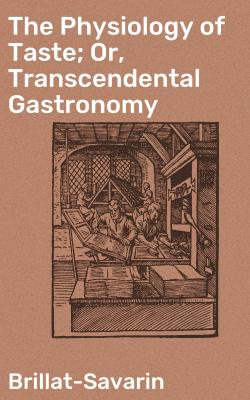ТОП просматриваемых книг сайта:
The Physiology of Taste; Or, Transcendental Gastronomy. Brillat-Savarin
Читать онлайн.Название The Physiology of Taste; Or, Transcendental Gastronomy
Год выпуска 0
isbn 4057664648549
Автор произведения Brillat-Savarin
Жанр Языкознание
Издательство Bookwire
Summary,
MEDITATION XV. HALTES DE CHASSE,
Ladies,
MEDITATION XVI. ON DIGESTION,
Ingestion,
Duty of the Stomach,
Influence of Digestion,
MEDITATION XVII. REPOSE,
Time of Rest,
MEDITATION XVIII. SLEEP,
Definition,
MEDITATION XIX. DREAMS,
Nature of Dreams,
System of Dr. Gall,
First Observation,
Second Observation,
Result,
Age,
Phenomena of Dreams,
First Observation,
Second Observation,
Third Observation,
Do as you will be done by,
MEDITATION XX. INFLUENCE OF DIET ON REST, SLEEP AND DREAMS,
Effects of Diet on Labor,
Dreams,
Consequence,
Result,
MEDITATION XXI. OBESITY,
Causes of Obesity,
Sequel,
Sequel,
Anecdote,
Inconvenience of Obesity,
Examples of Obesity,
MEDITATION XXII. PRESERVATIVE TREATMENT AND CURE OF OBESITY,
Generalities,
Sequel of the Regimen,
Dangers of Acids,
Antiobesic Belt,
Quinquina,
MEDITATION XXIII. THINNESS,
Definition,
Varieties,
Effects of Thinness,
Natural Predestination,
Fattening Regimen,
MEDITATION XXIV. FASTING,
Definition,
Origin,
How people used to Fast,
Origin of the removal of Restriction in Fasting,
MEDITATION XXV. EXHAUSTION,
Treatment,
Cure by the Professor,
MEDITATION XXVI. DEATH,
MEDITATION XXVII. PHILOSOPHICAL HISTORY OF THE KITCHEN,
Order of Alimentation,
Discovery of Fire,
Baking,
Oriental Entertainments—Grecian,
Roman Festivals,
Resurrection of Lucullus,
Poetry,
Irruption of the Barbarians,
MEDITATION XXVIII. RESTAURATEURS,
Establishment,
PHYSIOLOGY OF TASTE—Part Second,
TRANSITION,
VARIETIES,
I. L'omelette du Cure,
Omelette au Thon,
Observations,
II. A National Victory,
III. Mystification of the Professor and Defeat of a General,
IV. The Snare,
V. The Turbot,
VI. Pheasants,
VII. Gastronomical Industry of the Emigres,
VIII. Recollections of the Emigration,
The Weaver,
The Starving,
Sojourn in America,
Asparagus,
Fondue,
Recipe for Fondue, Copied from the Papers of M. Trollet,
Bailli of Mondon in Berne,
Disappointment,
Wonderful Effects of a Classical Dinner,
Effects and Danger of Strong Drinks,
Chevaliers and Abbes,
Miscellany—Wine,
Strawberries,
Judgment,
Raisins,
A Day with the Bernardines,
Prosperity en route,
H. … DeP … ,
Conclusion,
BIOGRAPHICAL SKETCH.
The excellent man to whom we are indebted for this book has described himself, with so much charm, nature and truth; the principal events of his life have been recorded in such an agreeable and faithful manner that very few words will suffice to finish the story.
Brillat Savarin (Anthelme) Counsel of the Court of Cassation, member of the Legion of Honor, member of the Society for the Encouragement of National Industry, of the Antiquarian Society of France, of the Philoselic Society of Bourg, &c., &c., was born, 1st of April, 1755, at Belley, a little Alpine city, not far from the banks of the Rhine, which at this place separates France from Savoy. Like his forefathers, who had been for several generations devoted to the bar, the profession which pleased him, in consequence of his possession of great eloquence, he practised with great success.
In, 1789, the unanimous vote of his fellow citizens deputed him to the Constituent assembly, composed of all that was most brilliant in the youth of France at that day. Less attached in practice to the philosophy of Zeno than that of Epicurus, his name does not figure very conspicuously, but always appears at epochs, which show that he acted with the good and moderate.
His legislative functions being determined by the expiration of the Constituent Assembly, he was first appointed President of the Superior Civil court of the Department of Ain, and subsequently a Justice of the Court of Cassation, newly instituted; a man of talent, perfectly incorruptible and unhesitating in the discharge of his duty, he would have been precisely calculated for the place to which he had been appointed, had the warmth of political discussion made practicable the advice either of moderation or of prudence. In

